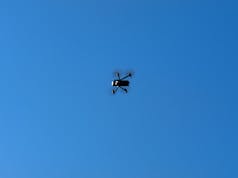The defence minister has suggested funding for the armed forces should be similar to that received by the NHS.
The Office for National Statistics say that the UK spent 9.8% of GDP on the NHS last year.
Ellwood said:
“You go back to the 1970s and 1980s and there was a parity between defence spending compared with health and education – and today we have dropped back to 2%.
The Government often does what people call for. If people call for more money for schools and hospitals, that is often where the money then flows. It is important we raise the profile of the dangers of reducing our defence posture. Once you lose it, you will never get it back.
I am deeply concerned we have a nation which is fully appreciative of our armed forces but which takes our security for granted.”
Recently, the Public Accounts Committee calculated an equipment plan funding deficit of at least £4.9bn and potentially as much as £20.8bn over the 10-year £179.7bn equipment budget.
The Ministry of Defence has put its faith in the Modernising Defence Programme to solve its affordability issues and to prepare for the continued challenges of a ‘fast-changing defence landscape’, including the UK’s capabilities for cyber, chemical, biological, radiological, nuclear and electromagnetic attacks. The report released today however is highly sceptical that the Modernising Defence Programme will be able to return the Department to a balanced position. The report also warned that the equipment plan contains “no headroom” and leaves the UK “increasingly dependent on international allies”.
According to the report, which can be found here:
“The Department faces a significant affordability gap in its Equipment Plan for the next 10 years, but is unable to determine the size of the gap, thereby reducing its ability to make informed decisions about our national defence.
There is an affordability gap of at least £4.9 billion in the Plan, rising to a potential £20.8 billion if all identified financial risks materialise and no savings assumed in the Plan are achieved. Financial risk has increased since last year, and while the Department acknowledges that the affordability gap is in the billions of pounds, it is unable to quantify the size of the gap with any degree of precision. We are concerned by the Department’s vagueness and reluctance to acknowledge its full exposure, and by the Department seeming to question the accuracy of its own numbers when giving evidence.
The Department says it is confident that at end of the Modernising Defence Programme, with cost information anticipated in autumn 2018, it will have a “strategically affordable” Plan, but is unable to articulate clearly how this will be achieved.”
Meg Hiller, who chairs of the committee, said the government had also failed to report transparently:
“The MoD’s national security responsibilities give it a unique and critical place in the public sector but that is no excuse for a lack of rigour in its financial affairs. The MoD’s inability to better quantify that affordability gap has consequences not just for its confirmed spending plans, but also its ability to prepare for serious challenges in national defence.
The department must be more rigorous and realistic in its approach to costing its equipment plan. It also needs to be more open with parliament and the public about its finances, commitments and their costs to taxpayers.”
An MoD spokesperson said:
“We are committed to delivering large, complex and technologically challenging defence programmes as part of our £180bn plan to give our military the very best equipment. We recognise financial risk comes with that, but the potential affordability gap highlighted by this report reflects an unlikely, worst-case scenario in which all possibilities materialise.
We are on track to meet our £16bn savings target and will also review these recommendations as part of our Modernising Defence Programme, which aims to strengthen our armed forces in the face of intensifying threats.”












I haven’t heard the statement directly in context but from the rest of the article I really don’t think that its opening sentence accurately reflects what Ellwood is reported here as saying…
“The defence minister has suggested funding for the armed forces should be similar to that received by the NHS.”
Err. No. He simply observed that in the 1970s and 1980s there was a parity between them and that defence has dropped massively since then. At least on the basis of what is presented in this article it is total invention to then connect those dots by assuming that he is suggesting that we move back to parity. He might be wanting that but I really don’t see anything in the quotes here where he is suggesting we should be at parity again.
If he were suggesting that then what does he mean? UK spent 9.8% on the NHS and 2.0% on defence last year which together adds up to 11.8% of GDP. Is he calling for 9.8% on defense to match the 9.8% spent on the NHS or maybe he is suggesting that we get back to parity by giving each of them half of the total NHS+defense pie so cut NHS spending to 5.9% of GDP (a 40% cut in NHS budget) so that both defence and the NHS get 5.9% of GDP?
Pretty clearly, at least to me, he is suggesting neither. He is simply making the point that defence spending has fallen so massively and I suspect the unspoken (or at least unquoted in this article) message he is trying to convey is that people calling for defence spending to go up to 2.5% or 3.0% of GDP really aren’t loons rather than the nonsense hypothetical suggestions I described above.
Agreed. Because of the changing needs of the population ie aging rapidly, the reality is we ar not going to spend equal amounts on defence as on the nhs. That doesn’t mean however that as a country we can’t and shouldn’t spend more on defence….ideally more towards 2.5% of gdp, but realistically more towards 2.2/2.3 % of gdp would be a significant uptick. I do think the consensus is slowly moving towards that but it does need constant reminders of the threats we face as a nation, and the massively positive role we have played, and still do, across the globe
I would suggest a half or 3rd at least of the foreign aid budget.
Not only does this help pur truly maginificent military but also keeps us as the of the most generous countries on earth!
Just my opinion
Wouldn’t it be lovely, BREXIT and other issues are always portrayed as pro-Britain and Britain first but it is hollow and empty rhetoric. We are the only Tier 1 partner in the F-35 and as such can control our own delivery schedule. We paid literally billions and billions of pounds towards the aircrafts development because we were intent on purchasing 180 of the airframes in just “b” or “A” and “b” models. But now we allow the Israeli’s and the Norwegianns and just about everybody else to take priority in the queue because our govt has only commited to 32 F-35b by 2022!!! Just 32, not enough for a full Combat Air Group on one carrier never mind two (both PoW and QE will be operational by the end of 2022) and replacing 0/zero Tornado Ggr4’s (the entire fleet of which is meant to be replaced by F-35’s which is why we invested so much in the first place. We are still going to retire our entire Tornado fleet and smply ave 90 Eurofighter Typhoons for both air defence/air superiority ops and strike and ground attack/support roles. According to the latest SDR we are stll commitd to a procurement of 160+ F-35’s but still no schedule or even a decision on what model and firm orders for just 32….. I do not know what to say. ALL British warships should be built in Britain. All our tanks and major weapons platforms and hardware should be made here. we used to have a superb defence industry, only a few years ago. we took a hammering when the Cold war ended but other countries weathered the storm and have come out the other end with a decent domestic defence industry. We on the other hand are now incapable of producing a new MBT for the army. Nowhere in country capable of building a new tank…… Wow, why is it when times are hard and industry and commercial enterprises shrink it is only in Great Britain that they come to a TOTAL end. Coal, steel and if the govt gets its way the last of our shipbuilding industry they have been hard years but why is it that our industries don’t just resize to a competitive but still existent establishment like everywhere else instead in Britain they just disappear completely?
[…] post Defence Minister Tobias Ellwood sets out demand for greater funding for the British Armed Forces appeared first on UK Defence […]
well something needs to be done and done quick..since trident was put into the defence budget add that to war pensions injury claims and then the bill for these witch hunt solicitors then the budget needs to be increased to at least 4%..5% would be better or take away what idiot Cameron and Osbourne did put trident into a separate budget put war pensions into the dwp scrap these witch hunt solicitors which just leaves the compensation bit which could be done out of the massive foreign aid budget then at least we would get the 2% spent where it should be spent..instead of manipulating the figures by saying we spend the 2% on defence when really it,s more like 1 and a quarter % i am very surprised NATO has not picked up on this as they have a go at all the other members who do not meet the 2% figure or am i missing something
I agree. I really don’t think, because of its nature, that CASD is a UK military asset. It’s easy to think of it as such because it is operated by military personnel but it is a “weapon” that is never intended to be used and is not, as I understand it, even at the discretion of military commanders to use (as I understand it the PM needs to authorise its use). CASD is more of a national insurance policy than a part of out deployable military assets and as such I really do think the previous practice of accounting for it outside of the core defence budget was the better reflection of its nature.
CASD and war pensions do count towards NATO target unfortunately which shows just how bad European Defence spending is. During the 80’s health and Defence spending both got about 4% each of GDP, pre NHS the armed forces got 8% of GDP. Basically the NHS has been paid for its entire life by cutting Defence spending.
Given the limited threat enviroment though, how much can you justify on Defence. Most of our budget is for force projection with very little for home Defence. It’s hard to tell someone they need to die from cancer to pay to keep troops in Afghanistan. We could easily defend the UK on 1% of GDP from Russia which is the only conceivable direct threat. Added together with the entire industrialised western world 1% is enough to fend of both Russia and china, beyond those two no one else is anywhere near posing a threat to NATO.
Its always so easy to cut the defence budget, there is hardly a whimper from the population. It’s almost done independently of global threats inspite of the SDSR analysis. Defence budgets should be viewed like stock market shares but with the warning “the value of the budget may go up as well as down based on the threat to our country/interests” – it really shouldn’t be a big deal and shouldn’t need national debate. 2% is really such a tiny amount considering “defence of the realm” is the government’s first responsibility. Clearly a lot has changed since 1990 “options for change” and we need to start making up the shortfall and cuts quickly.
Should we increase Defence Spending to levels of NHS spending? No we shouldn’t that’s absurd.
Should we increase defence spending to at least 3% in light of current threats? Yes we should. A start would be funding military humanitarian operations like Ruman with money from the foreign aid budget.
It won’t be put on parity with the N.H.S., but it should be put up to 3%.
“The government often does what people call for”. Now I know you’re making something up.
Are the British people calling for the 20 odd% of our country who are non White British to be increased? No, they most definitely are not. Is China, Korea, Thailand, Turkey, Pakistan, Japan, etc. over 20% a foreign race and still letting more in?
Are the British people calling for £billions of our hard earned money to be given away to foreign countries every single year (“foreign aid”)? No.
Are the British people calling for our industries (steel making, car making, train making, shipbuilding, etc.) to be completely owned by foreigners or tiny compared with comparable European countries? No. How are France, Germany, Italy producing much, much more steel than us? Why have they not sold every single car maker to foreigners? How are we not building cruise ships when they all are? Why has every last British train maker been closed only so foreign companies could open train making factories in our country and Britain’s railways then be used to keep them going forever, that is the worst one, that is sick and absolutely humiliating for a country like Britain with a proud engineering history especially in railways, that is our thing, they couldn’t bear for us to have even that 1 thing.
Did British people call for the war in Iraq and Afghanistan? No. There was huge protests against it in fact.
Are the British people calling for politically correct, anti white, anti British propaganda in the schools and media? No.
Most British people want the obsolete, over 50 year old 70 m.p.h. motorway speed limit increased to 80 m.p.h. Once again they go in direct opposition to what people want. Practically everyone else in Europe’s is already that or higher, other countries have indeed been increasing theirs without problems (Ireland, Holland, etc.).
I could go on and on and on all day. “the government often does what people call for”? More like the government usually goes in direct opposition to what people call for.
The UK has an interesting culture in which we adopt behaviours which achieve the opposite of what we need to achieve. Put differently you could say we struggle to make what we want equal to what we need.
You’re confusing being non-white with being foreign. Estimates of uk foreign born population is 13.6 per cent.
Wow, You just listed every crap old piece of 19th Century technology there and made it out that if you don’t make things like steel you are failing in engineering.
Do we need to build cruise ships? How many people in the UK want to work is a steel mill?
You do know that we are one of only two or three countries that can make advanced jet engines? And deep mind the worlds most advanced AI is made in the UK. How much do you think a medium sized country like the UK can do?
Unemployment is at an all time Low and since you don’t want to bring in more foreigners where will you get all the people to work in your steel mills and shipyards.
Sure there are issues with UK PLC being sold easily to cenrtain foreign entities like china however one of the issues is that UK PLC is way larger than the UK economy can sustain, companies like AstraZeneca are HQ in the UK even though they have nothing to do with the UK. I was sorry to see ARM holdings being sold to soft bank however perhaps the very smart people behind ARM recognised they had gone as far as they could in a maturing tech space. The billions over paid by Japanese companies will not be reinvested back into the UK tech sector perhaps into something new.
You make some excellent points but sadly you did spoil it a bit towards the end with a very strange (as in totally incorrect) comment…
AstraZeneca has a lot to do with the U.K., being formed out from a merger with a U.K. and a Swedish company. The U.K. company was the dominant partner at the time of merger (better prospects and pipeline) hence the HQ location. AZ has substantial R&D facilities just outside Cambridge (U.K.) which it has recently expanded significantly. One of my many friends in the pharma industry works as a scientist there. AZ also still have operations up in Cheshire although not R&D, that moved to Cambridge and elsewhere. There is still manufacturing up in Cheshire though I think.